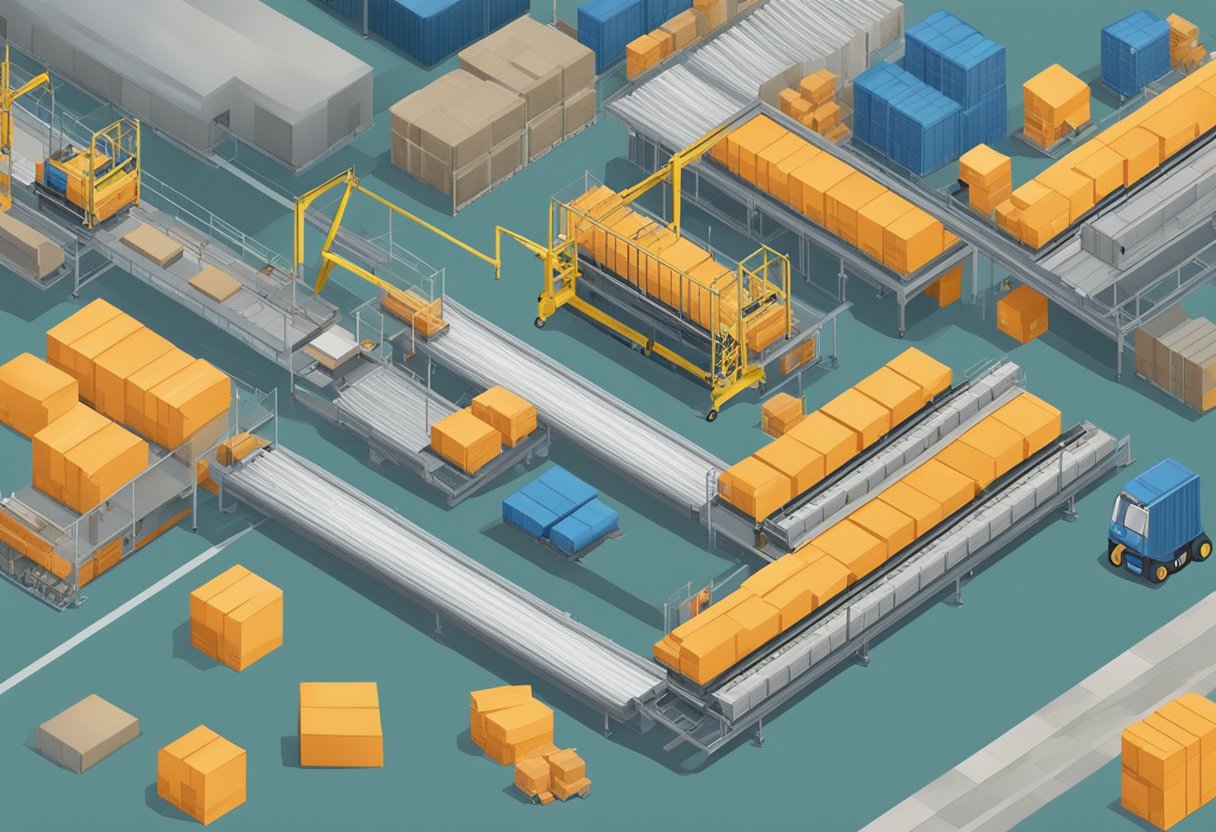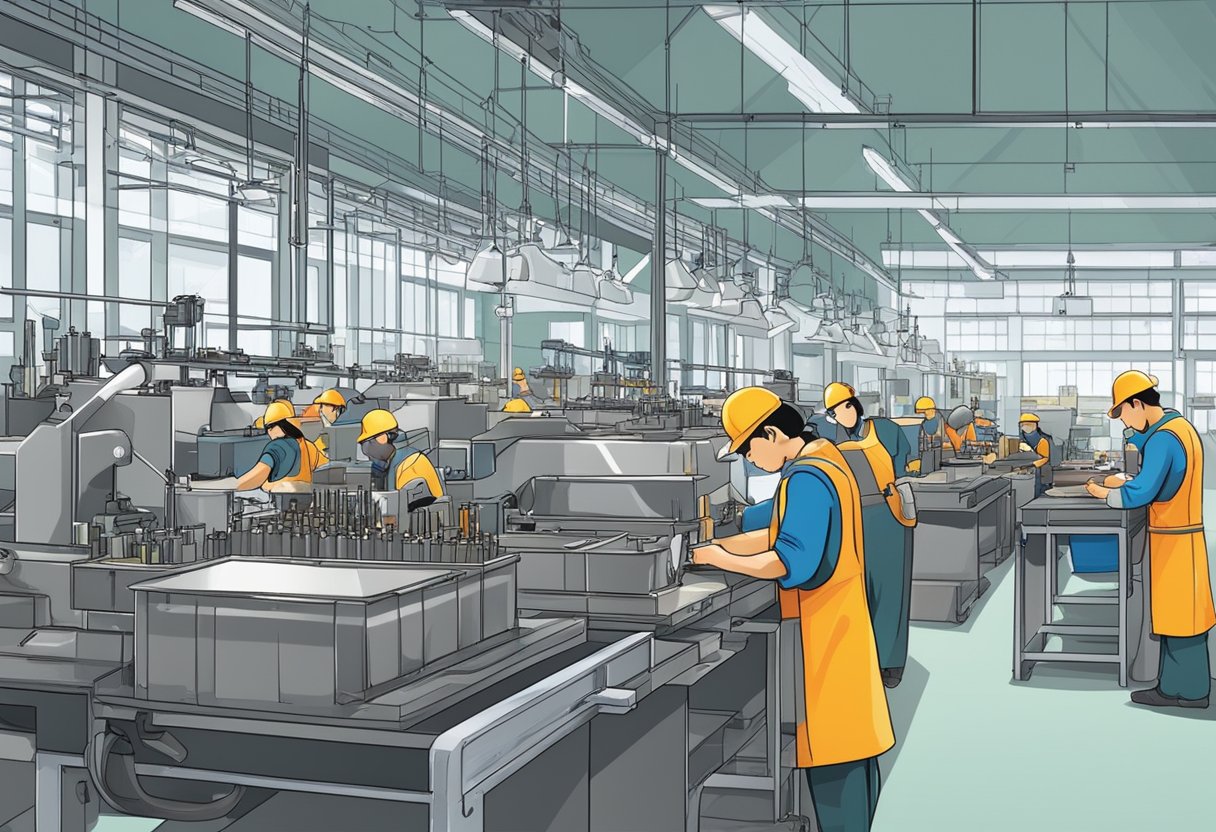China sourcing has become an increasingly popular practice for businesses around the world. With its vast manufacturing capabilities and lower labor costs, China has become a go-to destination for companies looking to source products at a lower cost. However, sourcing from China can be a complex process that requires careful planning and execution.

One of the biggest challenges of China sourcing is finding the right supplier. There are thousands of manufacturers and suppliers in China, and it can be difficult to determine which one is the best fit for your business. It’s important to do your due diligence and thoroughly research potential suppliers before making a decision. This includes checking references, verifying certifications, and conducting on-site visits if possible.
Another challenge of China sourcing is navigating the cultural and language barriers. Doing business in China requires an understanding of Chinese culture and customs, as well as the ability to communicate effectively in Mandarin or Cantonese. Hiring a local sourcing agent or interpreter can be helpful in overcoming these barriers and ensuring clear communication with suppliers. Overall, successful China sourcing requires careful planning, thorough research, and a willingness to adapt to a different business environment.
Understanding China Sourcing
China has become the world’s largest exporter, and as a result, sourcing from China has become increasingly popular. China sourcing is the process of buying products and goods from Chinese manufacturers, wholesalers, or suppliers. It has become a popular market strategy for companies looking to get products from reputable manufacturers in China and then sell them to their customers.
There are several reasons why companies consider China sourcing. Firstly, China offers a wide range of products and goods at affordable prices. Secondly, China has a large number of suppliers, making it easy for companies to find the right supplier for their needs. Thirdly, China has a well-developed manufacturing industry that has the capability to produce high-quality products.
However, there are also some challenges associated with China sourcing. One of the main challenges is the language barrier. Most Chinese suppliers do not speak English fluently, which can make communication difficult. Another challenge is the lack of transparency in the Chinese market, which can make it difficult to verify the quality of the products being sourced.
To overcome these challenges, it is important to follow some best practices when sourcing from China. Firstly, companies should look for the right suppliers who can meet their specific needs. Secondly, they should verify the supplier’s credentials and reputation before making any commitments. Thirdly, they should ask for samples to ensure that the quality of the products is up to their standards. Fourthly, they should communicate regularly with the supplier to ensure that any issues are addressed promptly. Finally, they should conduct quality control inspections to ensure that the products meet their specifications.
In summary, China sourcing can be a cost-effective and efficient way to get high-quality products. However, it is important to follow best practices and be aware of the challenges associated with China sourcing. By doing so, companies can minimize the risks and maximize the benefits of sourcing from China.
Finding and Verifying Suppliers
When it comes to sourcing products from China, finding and verifying suppliers is one of the most crucial steps. There are several ways to find suppliers, including online directories such as Alibaba, Made-in-China, and Global Sources. These platforms offer a quick and efficient way to search for products, view supplier profiles, and even place orders online.
However, it is important to verify that the supplier is legitimate and reliable before doing business with them. One way to do this is to check the supplier’s business license. The business scope section of the license should include words like “manufacture” or “produce,” which are typically only used by factories and not trading companies.
Another way to verify suppliers is to conduct a factory audit. This involves physically visiting the supplier’s factory or having a third-party inspection company do so. The audit should cover various aspects such as production capacity, quality control measures, and compliance with local laws and regulations.
In addition to these methods, there are also third-party verification services that can help verify suppliers. These services typically involve background checks, site visits, and verification of legal documents. Some popular verification services include SGS, Bureau Veritas, and TÜV Rheinland.
Overall, finding and verifying suppliers in China requires a thorough and careful approach. It is important to do your due diligence and use multiple methods to ensure that you are working with a legitimate and reliable supplier.
The Role of a Sourcing Agent
A sourcing agent is a professional who helps businesses find suitable suppliers for their products. They are responsible for negotiating prices, arranging freight, and ensuring timely delivery of goods. Sourcing agents are especially useful for businesses that are looking to source products from overseas countries where the goods are manufactured.
A China sourcing agent is a specific type of sourcing agent that specializes in finding suppliers in China. They have extensive knowledge of the local market and a wide network of contacts in the industry. They help bridge the gap between international buyers and Chinese suppliers, facilitating effective communication, fruitful negotiation, and timely delivery of the required goods.
The responsibilities of a sourcing agent include reviewing projects and factories to determine which projects a company would best be suited to handle. They also help in finding the right suppliers, negotiating prices, managing quality control, and arranging logistics. A sourcing agent acts as a liaison between the buyer and the supplier, ensuring that both parties understand each other’s requirements and expectations.
Sourcing agents are especially useful for small and medium-sized businesses that do not have the resources to establish a presence in the overseas market. They provide a cost-effective solution for businesses that want to source products from overseas without having to invest in the infrastructure required to do so.
In conclusion, a sourcing agent plays a crucial role in helping businesses find suitable suppliers for their products. They are especially useful for businesses that want to source products from overseas countries where the goods are manufactured. A China sourcing agent is a specialized type of sourcing agent that has extensive knowledge of the local market and a wide network of contacts in the industry. They help bridge the gap between international buyers and Chinese suppliers, facilitating effective communication, fruitful negotiation, and timely delivery of the required goods.
Language and Communication in Sourcing
Navigating language and cultural barriers is crucial in global sourcing. Effective communication is vital for successful collaboration with your China sourcing agent. However, language barriers can be a significant challenge when sourcing from China.
It is recommended to hire an agent who is fluent in both English and Chinese, even if some agents have a good command of English. A sourcing agent who is a native Chinese speaker can help overcome the language barrier and ensure clear communication between you and your suppliers, leaving no room for misunderstandings.
Moreover, establishing and maintaining successful relationships with Chinese suppliers and manufacturers requires more than just a basic understanding of English or relying solely on translation services. To truly thrive in the complex landscape of sourcing and manufacturing in China, native Chinese language communication is indispensable.
If hiring a sourcing agent is not an option, it is essential to have a reliable translator who can help you communicate effectively with your suppliers. However, it is important to note that using a translator can still result in misunderstandings due to cultural and linguistic differences.
To avoid misunderstandings, it is crucial to establish clear communication channels with your suppliers. This includes setting expectations for communication frequency and preferred methods of communication. It is also important to provide detailed and specific instructions to your suppliers to ensure that they understand your requirements and expectations.
In summary, language and communication are critical factors in successful China sourcing. Hiring a sourcing agent who is fluent in both English and Chinese or using a reliable translator can help overcome language barriers. Additionally, establishing clear communication channels and providing detailed instructions can help avoid misunderstandings due to cultural and linguistic differences.
Product Specifications and Quality Control
When sourcing products from China, it is crucial to ensure that the products meet the required specifications and quality standards. Product specifications refer to the detailed requirements and characteristics of a product, including its design, materials, dimensions, and performance.
To ensure that the products meet the required specifications, importers should provide detailed and accurate product specifications to their suppliers. This will help the suppliers understand the requirements and manufacture the products accordingly. It is also important to communicate any changes or updates to the product specifications to the suppliers in a timely manner.
Quality control is another critical aspect of China sourcing. Quality control refers to the process of ensuring that the products meet the required quality standards and specifications. It involves inspecting the products at various stages of production, from raw materials to finished products, to identify any defects or issues.
Importers can implement various quality control measures to ensure that the products meet the required standards. One such measure is to conduct product inspections and audits at the factory during production. This will help identify any issues early on and enable corrective action to be taken before the products are shipped.
Another quality control measure is to implement a product testing program. This involves testing the products to ensure that they meet the required performance and safety standards. Importers can either conduct the testing themselves or engage a third-party testing agency to conduct the testing on their behalf.
In conclusion, product specifications and quality control are essential components of China sourcing. By providing accurate product specifications and implementing effective quality control measures, importers can ensure that the products meet the required standards and specifications. This will help build trust and confidence with customers and ensure the success of their business.
Manufacturing Process in China
China has become a global manufacturing hub, attracting companies from all over the world to source their products from the country. The country’s manufacturing industry is known for its low-cost production, high-quality products, and efficient supply chain management.
The manufacturing process in China involves several stages, including design, prototyping, tooling, production, and quality control. The process is highly customizable, allowing companies to tailor their production to meet their specific needs.
The design stage involves creating a blueprint of the product, which is then used to create a prototype. The prototype is used to test the design and identify any issues that need to be addressed. Once the design is finalized, tooling is created, which involves creating molds and other tools necessary for production.
The production stage involves the actual manufacturing of the product, which can be done in-house or outsourced to a third-party manufacturer. Custom manufacturing is a popular option in China, allowing companies to create products that are tailored to their specific needs.
Quality control is an essential part of the manufacturing process in China. Quality control measures are put in place to ensure that the final product meets the required standards. These measures include inspections, tests, and certifications.
Overall, the manufacturing process in China is efficient and cost-effective, making it an attractive option for companies looking to source their products from the country. However, it is essential to work with a reputable manufacturer and have a clear understanding of the manufacturing process to ensure the quality of the final product.
Cost and Negotiation
When it comes to China sourcing, cost and negotiation are two critical factors that can make or break a deal. China is known for being a low-cost manufacturing hub, but the cost of production can vary significantly depending on various factors, such as the type of product, the materials used, the production process, and more. Therefore, it is crucial to have a clear understanding of the cost structure before entering into negotiations with a supplier.
One way to determine the cost of production is to request a detailed breakdown of the costs from the supplier. This breakdown should include all costs associated with the production process, such as raw materials, labor, overheads, and any other expenses. By analyzing this breakdown, buyers can identify areas where they can negotiate for better prices.
Negotiation is an essential part of China sourcing, and buyers must be skilled negotiators to get the best deals. Negotiation with Chinese suppliers can be challenging, especially for those who are not familiar with the Chinese culture and business practices. However, by following some best practices, buyers can improve their negotiation skills and get better deals.
Here are some tips for negotiating with Chinese suppliers:
- Research and prepare: Before entering into negotiations, buyers should research the supplier and the market to have a clear understanding of the cost structure and the market dynamics. This research will help buyers to identify areas where they can negotiate and the maximum price they should pay.
- Build a relationship: Building a good relationship with the supplier is crucial for successful negotiations. Buyers should try to establish a rapport with the supplier and show genuine interest in their business. This relationship-building process can take time, but it is worth the effort.
- Be clear and specific: Buyers should be clear and specific about their requirements and expectations. They should provide detailed specifications and quality standards to avoid any misunderstandings and ensure that the supplier meets their requirements.
- Be flexible: Negotiation is a give-and-take process, and buyers should be willing to compromise on some aspects to get a better deal. Buyers should be flexible and open to alternative solutions that meet their requirements and are within their budget.
- Use multiple suppliers: Buyers should consider using multiple suppliers to diversify their supply chain and reduce their dependence on a single supplier. This approach can also help buyers to negotiate better prices by creating competition among suppliers.
In conclusion, cost and negotiation are critical factors in China sourcing, and buyers must have a clear understanding of the cost structure and be skilled negotiators to get the best deals. By following some best practices, buyers can improve their negotiation skills and establish long-term relationships with Chinese suppliers.
Shipping and Logistics
Shipping and logistics are crucial aspects of sourcing from China. Without a reliable shipping solution, the entire sourcing process can be futile. When it comes to shipping from China, there are several options available, including air and ocean freight.
Air freight is the fastest option, but it can be expensive. It is ideal for small shipments or urgent orders. Ocean freight, on the other hand, is more cost-effective, but it takes longer to arrive. It is suitable for larger shipments or non-urgent orders.
Logistics management is equally important when sourcing from China. It involves managing the movement of goods from the manufacturer to the final destination. A reliable logistics provider can help ensure that goods are delivered on time and in good condition.
When choosing a logistics provider, it is essential to consider their expertise in international shipping regulations, documentation, and processes. A good logistics provider should also offer comprehensive logistics management, including warehousing, distribution, and customs clearance.
Working with a China sourcing agent can be beneficial when it comes to managing logistics and shipping. They can help navigate the complexities of international shipping and ensure that goods are delivered on time and in good condition. They can also help with Amazon FBA prep and compliance, which is crucial for sellers on the Amazon platform.
In conclusion, shipping and logistics are critical components of the sourcing process when dealing with Chinese manufacturers. It is important to choose a reliable shipping solution and logistics provider to ensure that goods are delivered on time and in good condition. Working with a China sourcing agent can also be beneficial in managing logistics and shipping.
Potential Risks and How to Avoid Them
Sourcing from China can be a lucrative business opportunity, but it is not without its risks. Companies must be aware of potential scams, security threats, and the need for legal protection when sourcing from China. In this section, we will discuss some of the most common risks associated with China sourcing and how to avoid them.
Scams
One of the most significant risks when sourcing from China is the potential for scams. Scammers can take advantage of companies that are new to the market or unfamiliar with Chinese business practices. Common scams include:
- Fake suppliers: Scammers pose as legitimate suppliers and take payment for goods that they do not have the capacity to deliver.
- Overpriced goods: Some suppliers will charge exorbitant prices for goods that are of poor quality or do not meet the specifications agreed upon.
- Counterfeit goods: Some suppliers may offer counterfeit goods that are cheaper than the genuine article but may be illegal to import.
To avoid scams, companies should thoroughly research potential suppliers and verify their credentials. They should also consider using a third-party inspection service to ensure that goods meet the agreed-upon specifications before payment is made.
Security
Another potential risk when sourcing from China is security. Companies must be aware of the potential for theft of intellectual property, data breaches, and cyberattacks. Some steps that companies can take to mitigate these risks include:
- Protecting intellectual property: Companies should register their patents and trademarks in China and work with legal experts to ensure that their intellectual property is protected.
- Secure data transfer: Companies should use secure channels for data transfer and ensure that their suppliers have appropriate security measures in place.
- Cybersecurity: Companies should work with their IT departments to ensure that their systems are secure and up to date.
Legal Protection
Finally, companies must consider legal protection when sourcing from China. Contracts and agreements must be clearly defined and enforceable. Companies should also consider using a Chinese lawyer to ensure that their interests are protected. Some other steps that companies can take include:
- Registering trademarks: Companies should register their trademarks in China to ensure that they are protected.
- Use of Incoterms: Companies should use Incoterms to ensure that the responsibilities of each party are clearly defined.
- Payment terms: Payment terms should be clearly defined in contracts, and companies should consider using a third-party payment service to ensure that payments are made securely.
In conclusion, companies must be aware of potential risks when sourcing from China. By taking appropriate steps to verify suppliers, protect intellectual property, ensure security, and seek legal protection, companies can mitigate these risks and take advantage of the opportunities that China sourcing presents.
Industry-Specific Sourcing in China
China is a leading global sourcing destination for various industries. Companies can find suppliers for a wide range of products and services in China, thanks to its vast manufacturing capabilities and competitive prices. Here are some examples of industry-specific sourcing in China:
Electronics
China is a major producer of electronics and is home to many leading electronics manufacturers. Companies can source electronic components, finished products, and related services from China. Some of the popular electronics products sourced from China include smartphones, laptops, tablets, and televisions.
Consumer Electronics
China is also a leading producer of consumer electronics, such as cameras, headphones, and gaming consoles. Many global brands have their products manufactured in China due to its low labor costs and high-quality standards.
Textile
China is a leading producer of textiles, including cotton, silk, and wool. Companies can source a wide range of textile products from China, including clothing, bedding, and curtains. China is also known for its high-quality silk products, which are sought after by customers worldwide.
Industrial Equipment
China is a major producer of industrial equipment, such as machinery, generators, and pumps. Companies can source industrial equipment from China at competitive prices and high quality.
Auto
China is the world’s largest automobile market and a leading producer of automobiles. Companies can source auto parts, components, and finished vehicles from China. Some of the popular auto brands sourced from China include Geely, BYD, and Changan.
Apparel
China is a leading producer of apparel, including clothing, shoes, and accessories. Companies can source a wide range of apparel products from China at competitive prices and high quality.
Health
China is a major producer of health products, including pharmaceuticals, medical devices, and traditional Chinese medicine. Companies can source health products from China at competitive prices and high quality.
Agriculture
China is a leading producer of agricultural products, such as rice, wheat, and vegetables. Companies can source a wide range of agricultural products from China, including fresh produce, processed foods, and animal feed.
Toys
China is a major producer of toys, including plastic toys, stuffed animals, and board games. Companies can source toys from China at competitive prices and high quality.
Arts
China is known for its rich cultural heritage and is a leading producer of art products, such as paintings, sculptures, and ceramics. Companies can source art products from China at competitive prices and high quality.
Tools
China is a leading producer of tools, including hand tools, power tools, and gardening tools. Companies can source tools from China at competitive prices and high quality.
In conclusion, China is a top sourcing destination for a wide range of industries due to its vast manufacturing capabilities, competitive prices, and high-quality standards. Companies can find suppliers for various products and services in China, from electronics and apparel to health and agriculture.
Case Studies and Success Stories

China has become a major player in the global economy, offering businesses around the world access to a wide range of high-quality and innovative products at competitive prices. Many companies have successfully sourced from China and have achieved significant cost savings and increased competitiveness.
One example of a successful China sourcing story is the case of a small business that wanted to introduce a new product line. The entrepreneur was able to find a reliable supplier in China, who provided high-quality components at a fraction of the cost of domestic suppliers. By sourcing from China, the small business was able to launch its new product line and gain a competitive advantage in the market.
Another success story comes from a large multinational corporation that was struggling to compete with its rivals. The company decided to implement a step-by-step guide to sourcing from China, which helped them identify the right suppliers and negotiate better prices. As a result, the company was able to reduce its production costs and improve the quality of its products, which helped it gain market share and increase profitability.
In addition to cost savings, China sourcing can also help businesses access innovative products that are not available domestically. For example, a company that specializes in consumer electronics was able to find a supplier in China that offered cutting-edge technology that was not available from any other source. By sourcing from China, the company was able to differentiate itself from its competitors and gain a loyal customer base.
Overall, these case studies demonstrate that China sourcing can be a valuable strategy for businesses of all sizes. By finding the right suppliers and negotiating favorable terms, companies can achieve significant cost savings, access innovative products, and gain a competitive advantage in the market.
Conclusion

China sourcing has become a popular strategy for businesses around the world. Despite the challenges and risks that come with it, sourcing products from China can offer significant benefits in terms of cost savings, quality, and access to a wide range of products.
When considering China sourcing, it is important to take a strategic long-term approach. Companies should prioritize those with experience and expertise in the industry to ensure a seamless supply chain. Additionally, diversification is key for supply chain resilience. While China retains significant advantages, sourcing from other countries can help mitigate risks and provide alternative options.
It is also important to understand the legal and regulatory environment in China. Working with a reputable sourcing agent or legal counsel can help mitigate risks and ensure compliance with local laws and regulations.
Overall, China sourcing can be a smart investment for businesses looking to stay competitive in today’s global marketplace. By taking a strategic approach and working with experienced partners, businesses can reap the benefits of China sourcing while minimizing risks and challenges.
Frequently Asked Questions

What are some reliable China sourcing websites?
There are several reliable China sourcing websites to choose from, including Alibaba, Global Sources, and Made-in-China.com. These websites allow you to search for suppliers and products, view supplier profiles and ratings, and communicate with suppliers directly. It is important to do your due diligence and research suppliers thoroughly before doing business with them.
How can I find and source manufacturers in China?
One way to find and source manufacturers in China is to attend trade shows and exhibitions. These events provide an opportunity to meet with suppliers face-to-face and see their products in person. Another option is to use online sourcing platforms like Alibaba, Global Sources, and Made-in-China.com. These platforms allow you to search for and communicate with suppliers directly.
What is the role of an agent from China in sourcing?
An agent from China can help you navigate the complexities of sourcing from China. They can assist with finding suppliers, negotiating prices, and handling logistics. They can also help with quality control and ensure that products meet your specifications. It is important to choose an agent with a good reputation and experience in your industry.
Are there any reputable product sourcing companies for China?
Yes, there are several reputable product sourcing companies for China. These companies can help you find and source products from China, handle logistics, and provide quality control services. Some popular companies include LeelineSourcing, Sourcing Allies, and Procurement Tactics. It is important to do your research and choose a company with a good reputation and experience in your industry.
What are some popular products to import from China?
There are many popular products to import from China, including electronics, clothing, toys, and household goods. It is important to research the market and demand for your chosen product before importing. It is also important to ensure that the product meets safety and quality standards in your country.
How do I find and choose a trustworthy Alibaba sourcing agent?
To find a trustworthy Alibaba sourcing agent, you can search for agents on Alibaba or other sourcing platforms. It is important to research the agent’s reputation and experience in your industry. You should also ask for references and check them before doing business with the agent. It is important to establish clear communication and expectations with the agent before starting any business.
